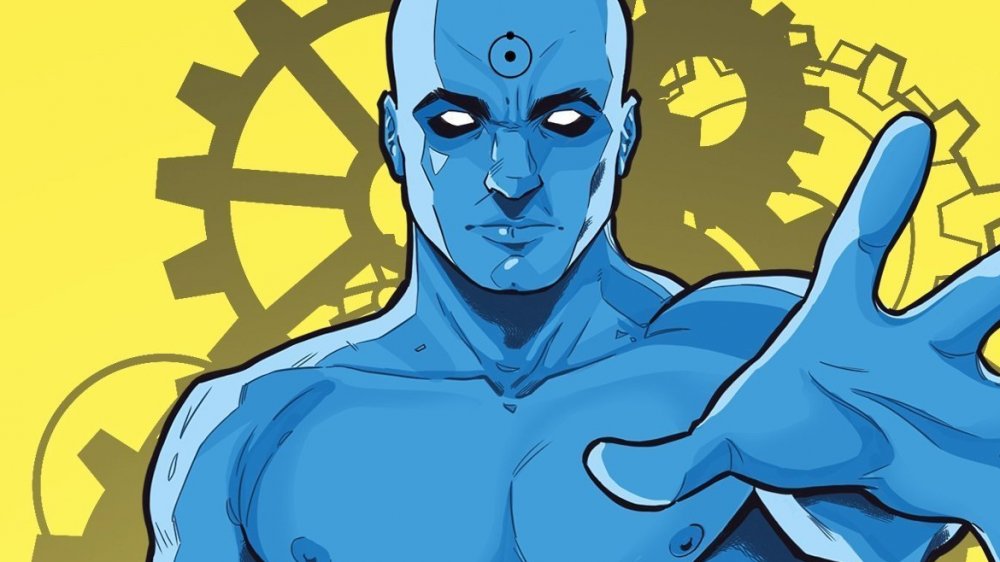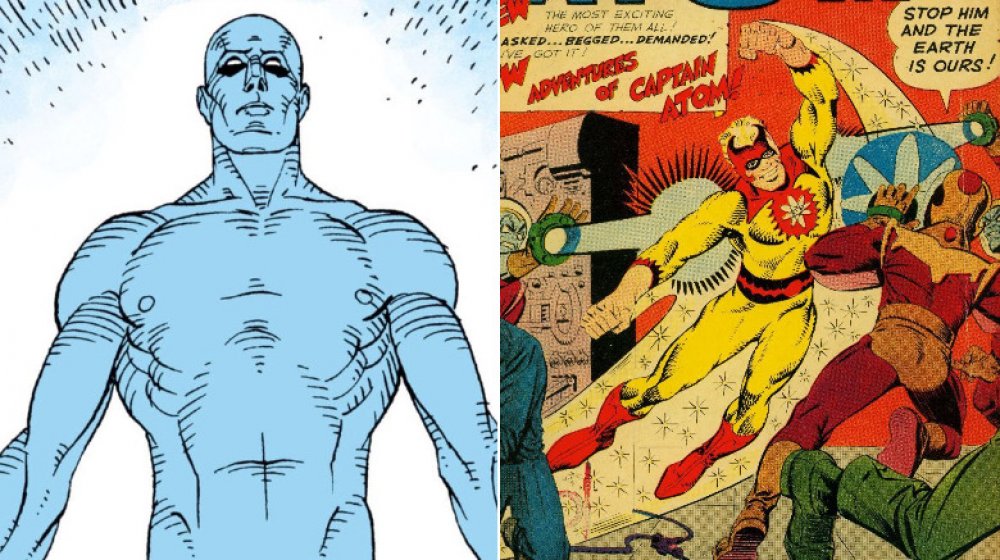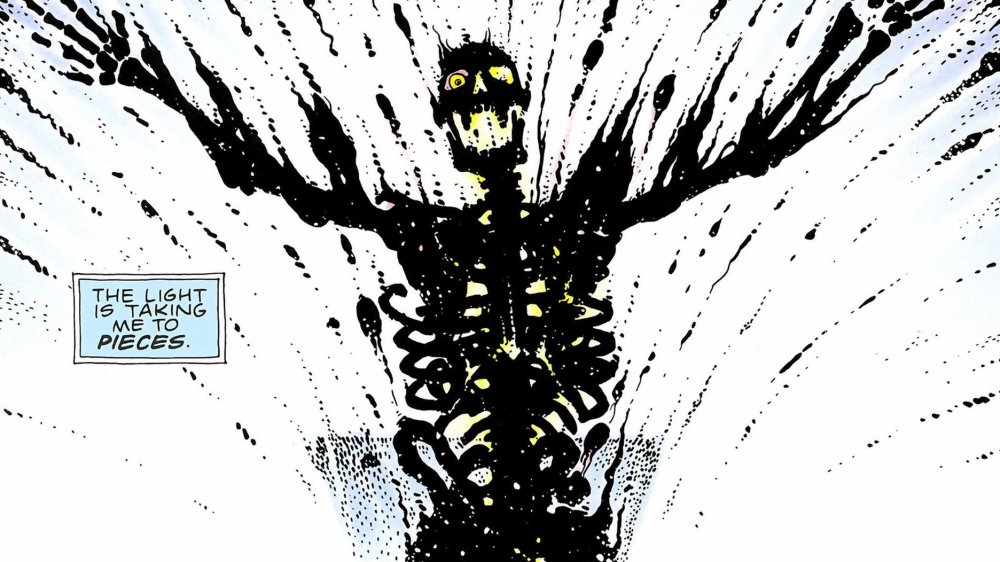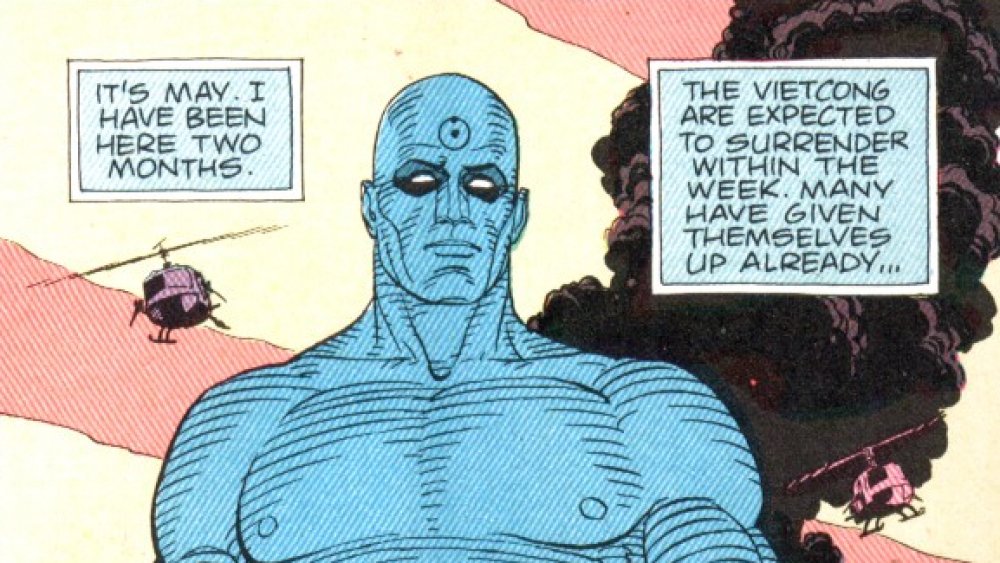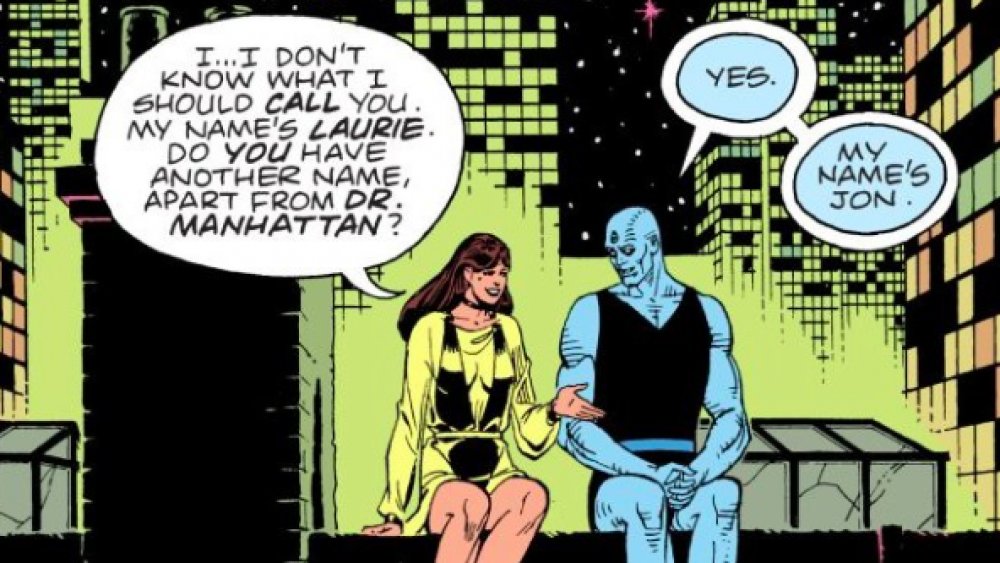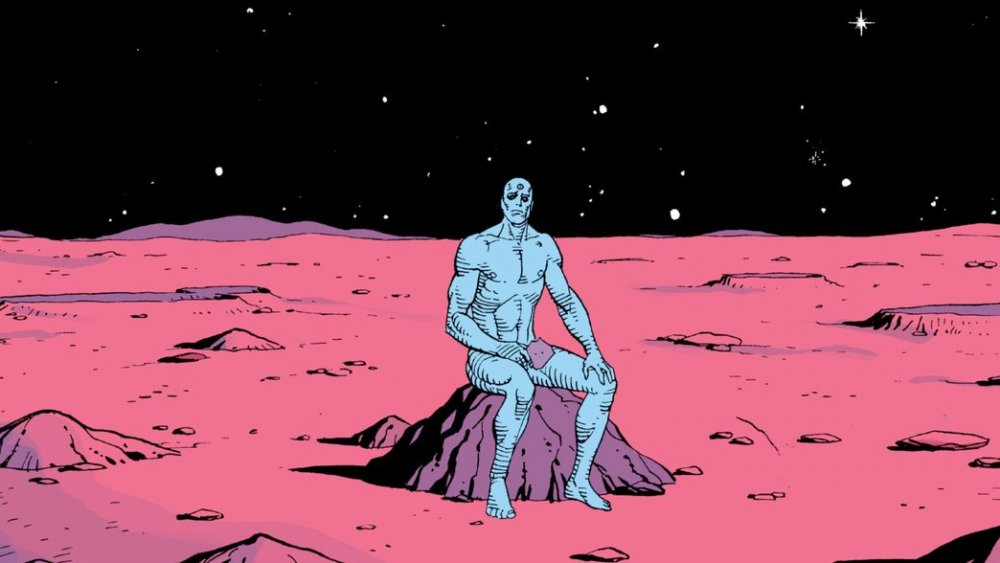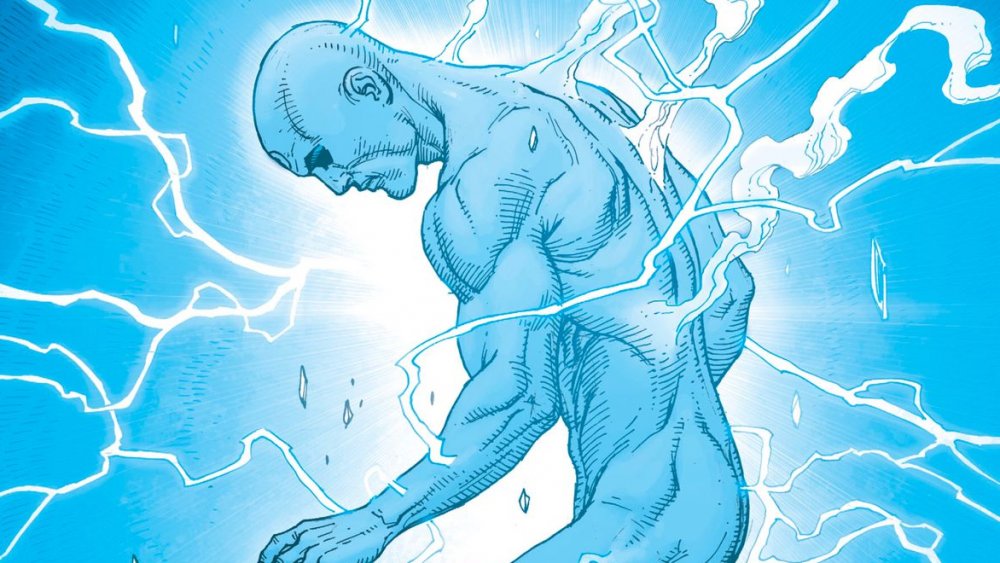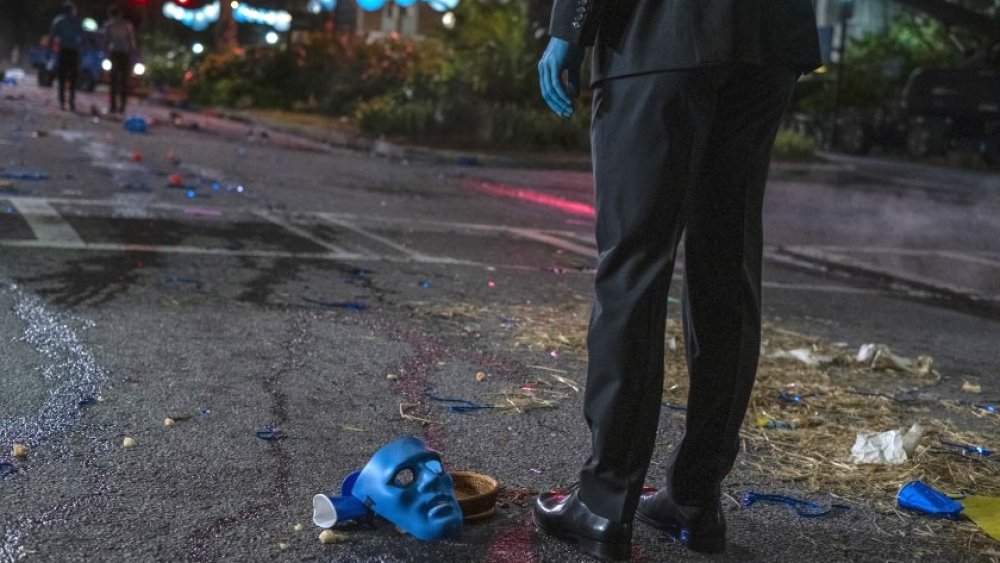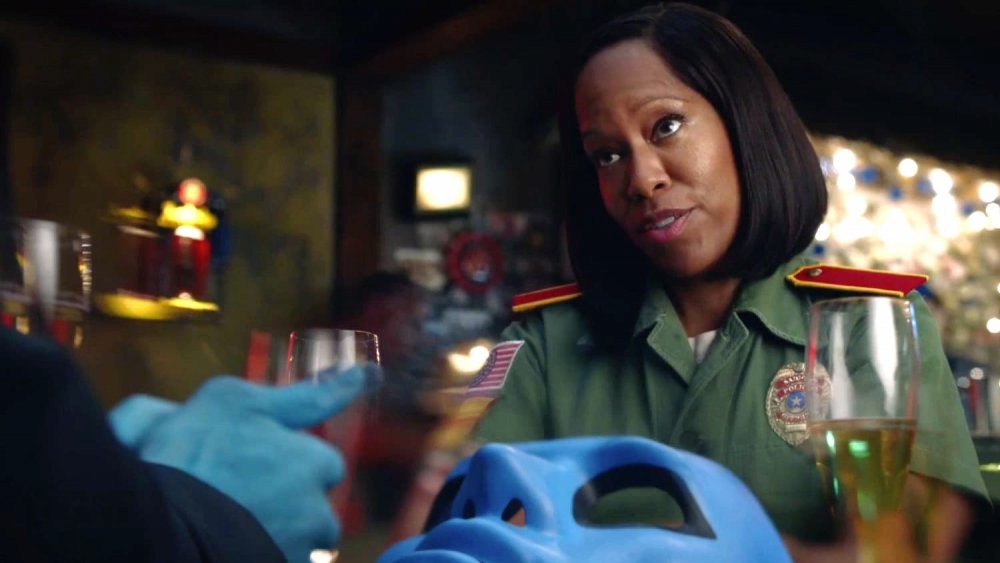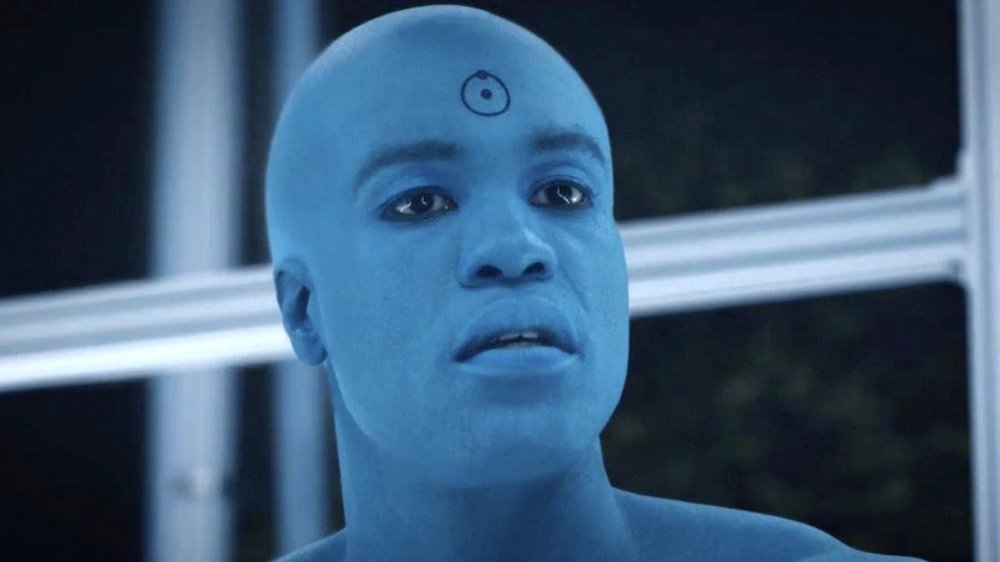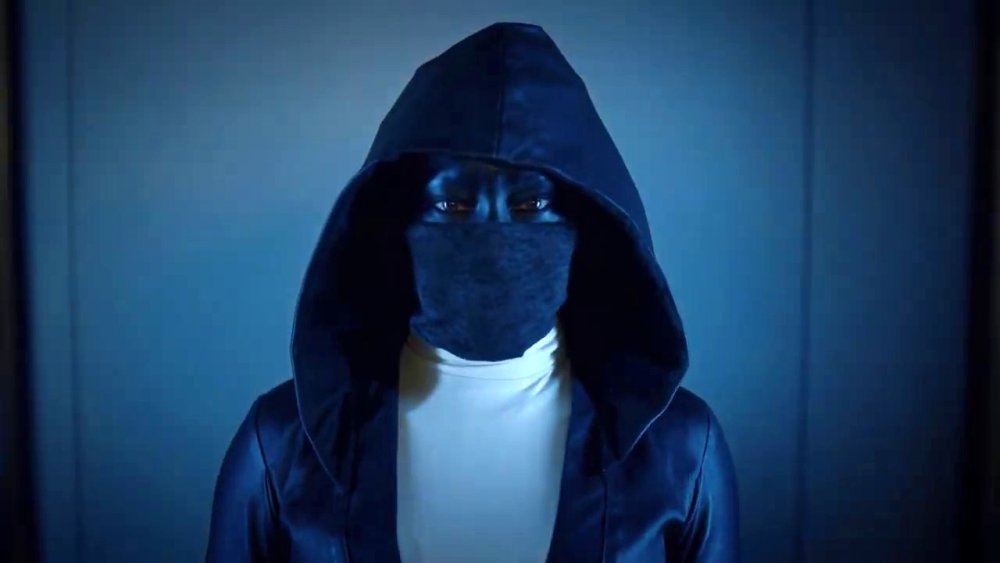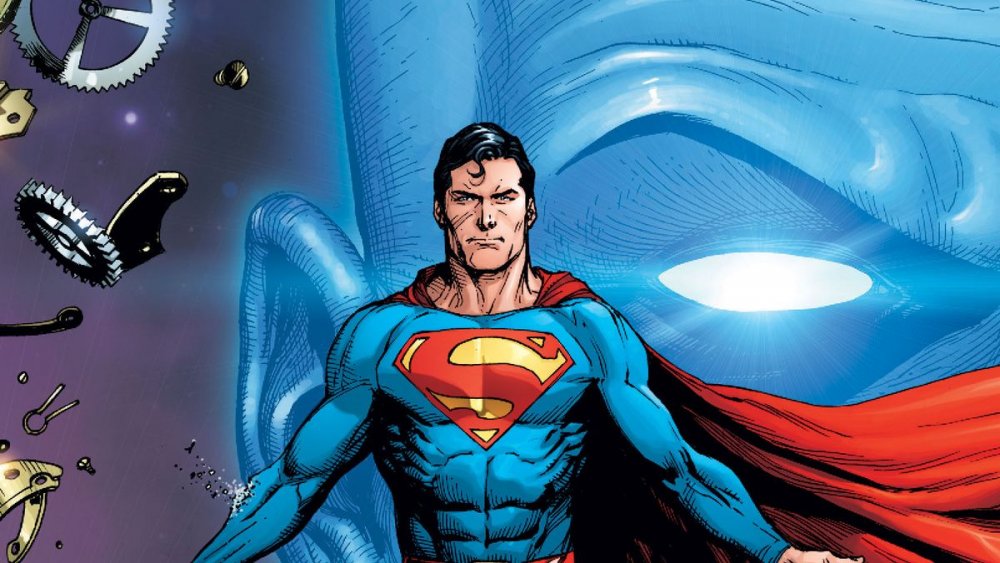The Untold Truth Of Doctor Manhattan
For a character first introduced in 1986, Doctor Manhattan has been in very few pieces of media — really just the original Watchmen graphic novel by Alan Moore and Dave Gibbons, a few other comics, the movie, and the HBO television series. But recent appearances in big DC Comics events and the acclaimed hit TV show have brought this big blue godlike being into the spotlight again, and new fans and diehards alike are re-evaluating the character and his relationship with the human race.
For viewers who came into the HBO show as its own thing and weren't aware of the character's history (or only watched the movie once), this can all seem a little confusing. Clearly, there's no time like the present for a look back at this mysterious character's origins, incredible past, and lesser-known exploits — and even if you're a hardcore Watchmen enthusiast, you may find a few surprises. This is the untold truth of Doctor Manhattan.
Who is Doctor Manhattan based on?
From a distance, it's easy to assume Doctor Manhattan is a direct allegory for Superman, despite the fact that one is an alien immigrant who still sees himself as part of humanity and the other is an average human forcefully changed into something godlike. The bigger inspiration for the big blue guy is Captain Atom, a Charlton Comics character created by Joe Gill and Steve Ditko who is turned into an "atom-powered being" and works for the military. After DC Comics acquired the Charlton characters, Moore pitched an idea to update those characters directly. Eventually his pitch was approved, but the Charlton characters were only used as inspiration for what became Watchmen. Other doppelgängers include Rorschach, inspired by the Question, and Nite Owl, Moore's spin on the Blue Beetle. The acquired Charlton characters were eventually fully incorporated into the DC Universe in their own right.
Jon Osterman's life (and death)
Dr. Manhattan started life as Jon Osterman. His father was a watchmaker (one of many watch-related themes in Watchmen), but pushed Jon hard to be become a scientist after he witnessed the destruction of World War II. Jon, a shy, nice enough man, grew up to become a physicist. During one of his experiments, Jon mistakenly left his girlfriend Janey's watch (which he was planning to fix for her) in the testing chamber. The door closed and locked behind him, trapping him during the test. It destroyed his body, seemingly annihilating him.
Months later, his body started to reform, bit by bit, in different areas of the Gila Flats research facility. Eventually, his coworkers realized it wasn't some grim specter but Jon himself — now blue, glowing, and naked. This new Jon was able to experience his entire life at any time, and could also teleport, grow into a giant, split into multiple bodies, and of course, explode people into bloody pulp.
Doctor Manhattan in Vietnam
Able to experience the past, present, and future of his life all at once, Jon started losing more and more of his empathy and humanity. After all, when you know everything that will happen to you, the choices you make feel less like choices and more like what simply is. It's easy to come to the conclusion that there's no reason to feel a sense of right and wrong if you've already experienced what's about to happen.
We see this especially when the Nixon administration recruits Jon to finish the war in Vietnam. Dr. Manhattan utterly crushes the North Vietnamese army, ending the war and bringing the country into the U.S. as the 51st state. He doesn't seem to enjoy the war, but he still calmly goes about blowing up the enemies of America. During the end of war celebration, Jon looks on as the Comedian (Eddie Blake) kills a woman claiming to be pregnant with his child. Dr. Manhattan is stunned by the cruelty he's just seen, but Blake points out that Jon himself could have blown him up or destroyed his gun. The Comedian might be a terrible person, but at this point, Jon has clearly largely lost touch with his humanity.
Meeting Laurie
After the war, Doctor Manhattan is invited by an aging Captain Metropolis (from the superhero team the Minutemen, seen in the HBO show) to meet with a new group of heroes Metropolis is hoping to collect into a new team. The meeting ends poorly and the new team is never formed, but there's a silver lining — this is where Jon meets Laurie Juspeczyk, the new Silk Spectre, taking over the mantle from her mother. He cheats on Janey (who he notes in narration is starting to show her age) with the young Laurie.
It's worth noting that Laurie is only 16 at the time she and Jon get together, while he's in his mid-30s. One of the more frustrating things about Doctor Manhattan is how he justifies every action he takes with some variation of "it was always going to happen this way, and it's already happened to me," which is certainly a disorienting way to live one's life, but doesn't change the fact that he entered into a sexual relationship with a teenager.
Doctor Manhattan and the events of 1985
In the present-day events of the Watchmen comics, Adrian Veidt, a.k.a. the wealthy genius and former superhero dubbed Ozymandias, is finalizing his plans for a worldwide hoax. By using new technology, Veidt and his team of scientists are trying to open a rift and drop a giant squid on New York City. The squid would die instantly, emitting a massive psychic shockwave and causing massive deaths throughout New York City (and as we see in the TV show, parts of New Jersey as well). By setting up a new, terrifying alien enemy, Adrian is hoping to devastate the world into world peace.
To keep his godlike former colleague from getting in the way, Adrian also fabricates evidence that Doctor Manhattan is radioactive and has been giving his loved ones cancer for decades. This accusation, made on live TV, overwhelms Jon; he flees to Mars, giving up on humankind. After an intense conversation with Laurie involving her very existence, Doctor Manhattan is convinced that humanity is indeed significant and should be protected. With Laurie, Nite Owl, and Rorschach, he rushes to Antarctica to stop Adrian's plot. But by the time they're face to face with their former colleague, it's 35 minutes too late: Adrian has already triggered the process. The immediate results are horrifying destruction and trauma in and around New York City, but various national leaders assume it was some kind of alien attack and start working together. The Cold War is apparently ending.
The so-called heroes have a choice to make — tell no one and keep the peace, or tell everyone the truth and potentially cause chaos and war. Everyone but Rorschach chooses to keep the secret, and Doctor Manhattan kills Rorschach before he can leave Antarctica. Jon decides to leave Earth again and possibly create life of his own. Adrian asks if he did the right thing in the end, but Jon leaves him with an unsatisfying, almost chilling answer: "In the end? Nothing ends, Adrian. Nothing ever ends."
Doctor Manhattan's weakness
Doctor Manhattan's most confusing aspect is easily his powers and their limits. He isn't all-knowing; he can only know the things he has experienced or will experience. Even then, it's challenging at times to juggle these experiences in his consciousness. The Watchmen TV show also examines the pain that comes with his powers. It's not just that he can see all parts of his life at once, but he truly experiences them each time. All the terrible moments of his life, pre- and post-accident, he feels fully at any given moment. Doctor Manhattan is a paradox in that way — he feels nothing, but he feels everything.
But if Jon knows everything his life at all times, then why can't he see the moment when he comes to Antarctica and faces Ozymandias? Well, that's where tachyon beams come into play. Tachyon beams are essentially Doctor Manhattan's greatest weakness. Adrian traps him in a tachyon field when the heroes come to Antarctica, and tachyon beams are also what Ozymandias uses to hide his plans from Jon until the very end. Naturally, the use of tachyon beams also plays a major role in the Watchmen show.
Doctor Manhattan in HBO's Watchmen
The Watchmen HBO show keeps pretty much everything from the comics in canon, but fills in some mysteries (like the real identity of Hooded Justice, for example) and tells us what happens in the years after the squid drops.
As in the comics, Doctor Manhattan (played by Yahya Abdul-Mateen II) leaves Earth during the aftermath of the disaster. Everyone assumes he's on Mars, but the footage they have of him on the red planet is simply a decoy; in actuality, Manhattan has gone to Europa to create new life. Inspired by the kind English couple who welcome him and other German refugees into their mansion during World War II (a part of his childhood explored in the 2012 prequel comic Before Watchmen), the life Jon creates is identical to his kind benefactors. He even moves the actual manor from England onto Europa. While he is pleased with his new world at first, he finds that two beings who worship him and want nothing else isn't really love, and he returns home to Earth.
Meeting Angela Abar
Doctor Manhattan returns to Earth — specifically to Vietnam, on the anniversary of the end of the war and the beginning of it being a U.S. state. In the same bar where he watched the Comedian kill a pregnant woman in the comics, Jon meets Angela Abar, a cop whose parents were killed by anti-Manhattan radicals on this day years ago. Angela assumes his appearance is a costume, like the many other "Doctor Manhattans" out for the holiday. Insisting he's the real thing, Manhattan lays out their life together, because he can see that she takes him up on his offer of a date and they end up getting together. But Jon can only see until a point — something is blocking about 10 years of his life with Angela, and the block ends just before tragedy strikes. He just knows that they fall in love and have about ten years together before someone takes him away from her. Despite all this (and the fact that she doesn't even believe he's really Doctor Manhattan during their first talk), Angela agrees to another date — and eventually falls in love with him.
During this period, Jon takes the identity of a recently deceased man named Cal Jelani so he can be with Angela without being discovered. But this is only a surface solution; Jon's godlike status puts a strain on their relationship. Like his past girlfriends, Angela is frustrated and needs him to be in the present, but as Doctor Manhattan, he's always feeling the past, present, and future all at once.
Doctor Manhattan's life as Cal Abar
Jon, not wanting to lose Angela, visits Adrian Veidt in Antarctica, who offers him an option — a small implant, powered by tachyon technology, that will cause Jon to forget who he is. This is the space in time that Jon can't see. Angela agrees to help him implant the device, and his mind goes blank. Angela "finds" Cal after a bad car accident and the hospital determines he has amnesia. Cal falls in love with Angela all over again and they get married, with him taking her name.
The couple leave Vietnam for Oklahoma, where Angela's family is from. They're happy together, but throughout their marriage in Tulsa, Angela knows that their time is short.
Eight years after they move to Tulsa, a white supremacist group called the Seventh Kalvary attacks the couple (and the rest of the police force in the city) in their home on Christmas Eve. In a moment of adrenaline, Cal unknowingly uses his hidden powers to teleport one of the attackers miles away. While this saves his wife's life, it also lets the Kalvary (led from the shadows by Senator John Joseph "Joe" Keene Jr.) know Doctor Manhattan is hiding in Tulsa.
The End of Doctor Manhattan
Two years after the Tulsa attack, during the present day of the HBO Watchmen series, Angela learns from the mysterious and unnerving Lady Trieu about the Seventh Kalvary's plan to pull Jon's lifeforce and put his powers into Senator Keene, making the white supremacist a god in his own right. Rushing home, Angela removes the tachyon implant from Cal's head, bringing Doctor Manhattan's consciousness back to the surface.
While Angela desperately tries to get Jon to hide from the Kalvary while he still can, Jon does a series of things in and around their house, including taking eggs out of the fridge to make an omelet and walking on top of the water in their pool. Jon tells his wife it's important that she sees everything he's doing. Like Jon said she would, Angela gets ready to take on the Kalvary by herself to protect her husband, and he tells her that this was always the moment he fell in love with her. She gets a little frustrated that it's only now that he loves her, but he reminds her that he is in this moment at all times, just like he's still sitting in that bar in Vietnam asking her to dinner.
The Seventh Kavalry starts the machine to steal Doctor Manhattan's powers, but Lady Trieu is one step ahead of them; she takes control of their operation and reveals her plan the whole time was to take Jon's powers for herself and force the nations of the world to finally create true peace. In his last moments, Jon looks at Angela and experiences all the wonderful moments of their marriage at once. He is truly at peace and fully connected with his humanity as he dissolves into nothing.
The New Doctor Manhattan?
While Jon dies, he manages to send Adrian Veidt to his Antarctic lab, where Adrian uses his squid dispatch — created to ensure the world stays afraid of another attack — to destroy Trieu's machine and Lady Trieu herself. We learn from Angela's grandfather Will, who has been working with Trieu, that Jon set up Trieu's interception of the Kavalry's plan the whole time.
Later, at Angela's home, Will suggests that while he ended up liking her husband, he thinks Doctor Manhattan could have done so much more with the power he had. Angela then remembers a conversation she had with Jon when they first met; theoretically, he could transfer his powers to someone else through an ordinary egg and, among other things, this person would be able to walk on water like him. In the kitchen, there's one egg left from the omelet Jon made before he died.
On a hunch, Angela walks out to their pool, swallows the egg whole, takes a step out onto the water — and the show cuts to black. That said, showrunner Damon Lindelof's post-finale interviews clearly encourage viewers to believe that Doctor Manhattan's massive power is now within Angela. It's up to us to consider what she'll now do with these powers, but the finale leaves us with potential optimism.
And that's the story of Doctor Manhattan.
Almost.
Doctor Manhattan in the DC Universe
The original Watchmen comics didn't exist in mainline DC continuity, but the enduring popularity of the story and its characters ultimately proved too tempting for the creative minds at the company to resist — and with the 2017-'19 event dubbed Doomsday Clock, they used Doctor Manhattan to recalibrate the canvas while clearing up numerous questions from DC's recent past.
As comics readers are aware, Doomsday Clock marks the third in a series of line-wide events acting as reboots of DC continuity to some degree. It started with the New 52 event of 2011, which essentially started over from scratch, ostensibly to give new readers an easy entry point into increasingly complex stories. Reception was mixed, leading the company to try again with another line-wide event, Rebirth, in 2016. Less of a reboot than a fine tuning of the stories started with New 52, Rebirth set the stage for the Doomsday Clock event, which pulled Doctor Manhattan into the main DC universe — and revealed he'd been responsible for the New 52 reboot in the first place.
At Watchmen's conclusion, we see Doctor Manhattan departing his universe in search of a simpler existence. As Doomsday Clock ultimately explains, that journey led him to the DC multiverse, where his unique abilities allowed him to see — and ultimately affect, alter, or undo — numerous critical moments in its timeline. During this period, Jon becomes convinced that Superman is the locus point for everything in the multiverse, and he comes to realize that he's actually in a metaverse, where everything that occurs has a ripple effect on the rest of the various timelines. Superman finally confronts Doctor Manhattan, but instead of fighting each other to the death, he reasons with Jon and convinces him to roll back things he'd changed in DC history. Crisis averted, Doctor Manhattan leaves the DC universe to go back to his own — and try to make it better.
In the wake of HBO's Watchmen and the end of Doomsday Clock, readers and viewers have seen a greater degree of complexity to Doctor Manhattan's connection to people and his sense of self. This spark of love and hope is what keeps Doctor Manhattan interesting — it's humanity that makes a god worth discussing, more than three decades after his debut.
